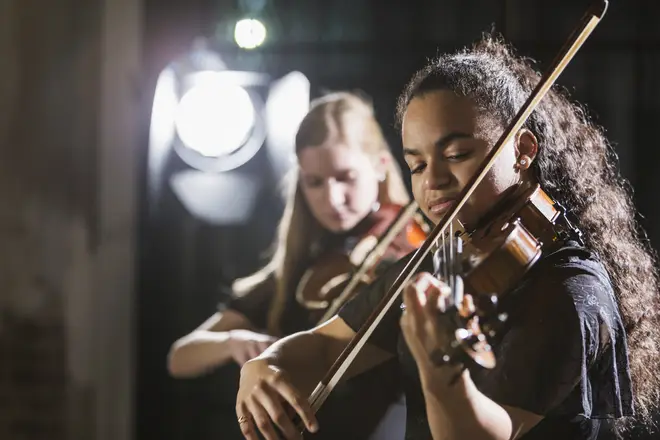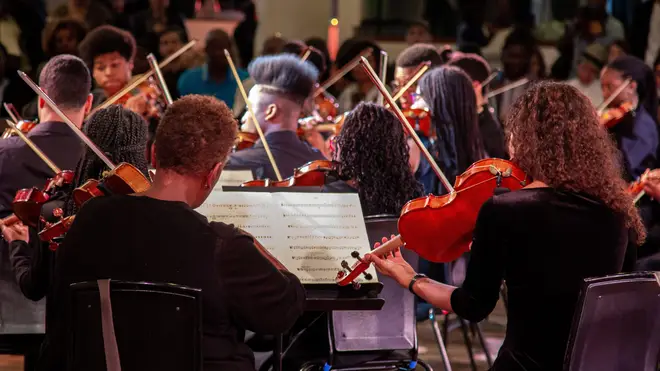On Air Now
Relaxing Evenings with Zeb Soanes 7pm - 10pm
13 October 2021, 13:00 | Updated: 13 October 2021, 15:03

New report offers insight into the experience of the Black professionals in today’s music industry. Almost 2000 Black music creators and industry professionals shared their personal experiences of navigating their professional journeys in the UK.
A major survey has revealed that 63% of Black musicians in the UK music industry have experienced racism. A further 71% have experienced racial micro-aggressions.
The Being Black in the UK Music Industry report was commissioned by Blacks Lives in Music and is the largest survey of Black musicians and music industry professionals conducted in the UK.
1,718 music professionals took part. The report reveals that racism, pay discrepancies, and mental health issues are rife for Black performers, with almost three quarters (74%) saying they were dissatisfied with how the music industry supports Black music creators.
The report also highlights that 35% of all Black music creators said that they “felt the need to change their appearance because of their race/ethnicity”, rising to 43% of Black women.

Chi-chi Nwanoku: ‘After a three-decade career in classical music, I was still the only person of colour on stage’
“There’s a certain air about people who play classical music and obviously there's a lot of privilege that comes with that,” says Lavender Rodriguez.
Rodriguez is a queer Black musician included as a case study in the Black Lives in Music report. She describes how as a someone starting her career in the classical music industry, she quickly began to feel “isolated in a world that shows a subconscious lenience towards white male composers”.
She argues that the problems with classical music privilege starts as early as in the classroom.
“With this whole traditional atmosphere and attitude, it’s very much like if you're going to play music you have to learn music theory and then Mozart, Beethoven, and all the classics, but music has changed so much.” she says.
“They are classics, but there are other people that are classics also and other people that mean a lot more to young children than people that died 400, 500 years ago.”
Read More: German pop singer calls for Beethoven’s body to be exhumed for a racial DNA test

Chineke! Orchestra performs Adolphus Hailstork’s ‘Epitaph for a Man Who Dreamed’
Other music professionals surveyed responded with similar experiences. One anonymous respondent said that “western classical music is still so heavily a part of our education in music and is so inherently white, that it creates an accidental culture where we don’t see enough racial diversity in our musical education through school and into university.”
The report advises that a Black youth voice element must be present in discussions on practice and policy change to ensure that young people have a say in what their music education looks like. In order for young Black people to feel empowered and achieve, there should be a better reflection of their own identity in the music classroom.
Earlier this year, the exam board Edexcel almost stripped its syllabus of its only Black composer, had it not been for a public outcry, and a study in last year's British Journal of Music Education reported that 98.8% of pieces on the latest ABRSM syllabus were written by white people.
Read More: Star violinist Randall Goosby: ‘Four Black composers you should know in Black History Month’

A lack of diversity within music education has lead to a ‘normalisation of whiteness’ says the Black Lives in Music report.
It says together with the stereotyping of so-called ‘Black music’, many Black and ethnic minority students have had their musical aspirations limited due to significant adverse psychological effects.
Whilst previous research on race, the music industry, and music education in the UK has been limited, reports such as the Equality and Diversity in the Classical Music Profession and the implementation of diversity benchmarks at various conservatories across the UK, have shown that the number of non-white musicians in the classical industry is very low.
The Equality and Diversity in the Classical Music Profession report reveals that after taking 629 musicians from 17 different orchestras, less than 2% were Black and from an ethnic minority background. Meanwhile, the Royal College of Music have recently set up a Diversity Action Group after disclosing in a 2019-2020 Access, Disabilities and Equal Opportunities report that they were still below the benchmark for ethnicity targets to promote a more diverse student intake.

The report recommends that the music industry addresses the following four areas if there is to be transformative change: